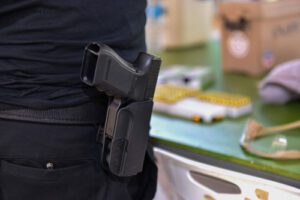 Judge Bumb continued: The Louisiana law appears historically inconsistent and unconstitutional, and in any event, it is but one example. The Court should not stake its “interpretation of the Second Amendment upon a single law, in effect in a single State.” Bruen, 142 S. Ct. at 2153. Additionally, the lack of other examples in the historical record is suggestive of the point that firearm owners have been permitted to carry their weapons on private property without prior consent. See id. at 2131.
Judge Bumb continued: The Louisiana law appears historically inconsistent and unconstitutional, and in any event, it is but one example. The Court should not stake its “interpretation of the Second Amendment upon a single law, in effect in a single State.” Bruen, 142 S. Ct. at 2153. Additionally, the lack of other examples in the historical record is suggestive of the point that firearm owners have been permitted to carry their weapons on private property without prior consent. See id. at 2131.
In fact, the State’s own historical evidence supports a finding that there is a presumption under the Second Amendment that an individual can enter private property with a firearm unless the property owner says otherwise. For instance, in the hunting context, criminal liability for a trespass on the land of another for the purpose of hunting wild animals has typically required the landowner to post a notice or personally forbid others from trespassing. See, e.g., State v. Wouters, 71 N.J. Super. 479, 485, 117 A.2d 299, 302 (App. Div. 1962) (citing N.J.S.A.23:71, which provides for a fine for entering the land of another to hunt in disregard of conspicuous notice or personal knowledge forbidding trespass); Hopewell Twp. v. Gruchowski, 29 N.J. Super. 605, 608, 103 A.2d 177, 179 (Cty. Ct. 1954) (“Since 1895 the New Jersey Legislature has passed several laws concerning trespassing and for the first time introduced criminal sanctions. The first was L.1895, p. 307, an act to prevent trespassing with guns. This law and all subsequent trespass laws have one element in common: to constitute a violation of them, the land must have been conspicuously posted with notices forbidding trespassing or the defendant must have been personally forbidden to trespass. The posting of the land or the giving of personal notice is a major substantive element of the offense.”).
In other words, in New Jersey the burden is on the landowner to demarcate his property and to advise others not to trespass. Only then can the trespasser be found criminally liable for trespassing for the purpose of hunting. Similarly, under New Jersey’s ordinary criminal trespass statute, the trespasser commits an offense only if, “knowing that he is not licensed or privileged to do so,” he enters or surreptitiously remains.” N.J.S.A. 2C: 18-3 (emphasis added). “The offense is a crime of the fourth degree if it is committed in a dwelling.” Id. Likewise, under the defiant trespasser subsection, “[a] person commits a petty disorderly persons offense if, knowing that he is not licensed or privileged to do so, he enters or remains in any place as to which notice against trespass is given by: (1) actual communication to the actor; or (2) posting in a manner prescribed by law or reasonably likely to come to the attention of intruders; or (3) fencing or other enclosure manifestly designed to exclude intruders.” N.J.S.A. 2C: 18-3b.(1)–(3) (emphasis added).
The Court reviews the penalties regarding typical trespasses unrelated to firearms possession. It is unclear what penalties apply if a valid permit-to-carry owner is found entering private land where the owner has conspicuously posted that no one carrying a firearm is allowed to enter. One argument is that a common trespass penalty applies. Another is that a third-degree crime for unlawful possession of a firearm applies since the possession becomes unlawful upon entering private land where firearms possession is prohibited.
